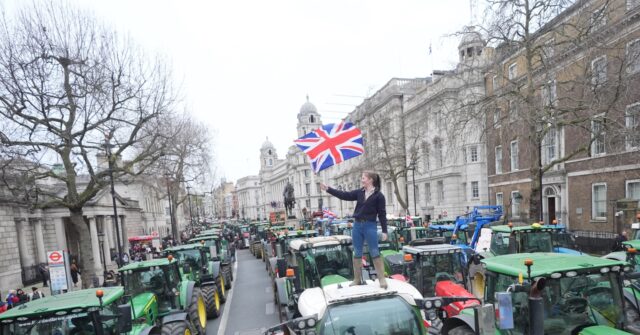On a recent Wednesday morning, the streets of central London were overrun by an estimated 500 tractors as British farmers staged protests against the Labour government’s proposed changes to inheritance tax requirements for family farms. These demonstrations saw significant disruptions in traffic around Whitehall and reflect the escalating tension between the agricultural community and Prime Minister Sir Keir Starmer’s administration. Farmers, organized under the “No Farmers, No Food” campaign, have made it clear that they are prepared to intensify their protests if their grievances regarding the government’s financial policies are not addressed.
Charles Goadby, a dairy farmer and member of the No Farmers, No Food steering group, criticized the government’s current stance. He characterized the administration’s refusal to acknowledge the issues raised by farmers as akin to the behavior of a “petulant toddler.” Goadby insisted that the protests were just the beginning of a larger movement and emphasized the need for the government to reconsider its plans. Alongside him, Liz Webster, founder of Save British Farming, indicated that if the situation does not change, farmers might resort to withholding food supplies next year, demonstrating the potential impact of the government’s tax policies on food security and agricultural sustainability in the UK.
Since taking office in July, the Labour government has argued that the country’s financial situation necessitates increased taxation. Chancellor Rachel Reeves highlighted the need for substantial revenues to fill a projected £22 billion “black hole” in public finances, a deficit attributed to the previous Conservative government. As part of a broader high-tax strategy, Reeves has proposed eliminating an inheritance tax exemption for family farms that has been in place since 1984. According to this new plan, by 2026, farms valued at £1 million (or £2 million for married couples) will be subject to a 20 percent inheritance tax, placing further financial strain on multi-generational family farms.
In response to the government’s assertions that only wealthy landowners would be affected—and that three-quarters of farms would remain exempt—the National Farmers’ Union (NFU) has raised alarms, estimating that up to 60 percent of family farms could eventually be at risk. This change poses a significant threat to small family-run farms, which may find themselves needing to sell parts of their land simply to pay the impending tax. As modern agricultural practices evolve, many small farms are already struggling to maintain their viability, raising concerns about the future of farming in the UK.
Many farmers are personally affected by these potential tax changes. Phil Cookes, a 38-year-old farmer who protested with his family, shared a poignant story about the financial implications for his own family farm. With his father managing a third-generation 200-acre operation valued at nearly £3 million, the prospect of a hefty inheritance tax upon the death of his father creates a distressing scenario for their family. With the government pursuing these tax measures, Cookes expressed a sentiment that resonates with many in the farming community: “my dad can’t afford to die while Labour are in power.”
The protests also garnered wider political support, including figures such as Nigel Farage, leader of Reform UK, who criticized the government for its alleged motives behind the tax changes. He claimed that the intention appears to be a strategy to acquire farmland for housing development, thus exacerbating the pressures faced by smaller, family-run farms. Farage pointed to the disconnect between the government’s financial policies and the realities of farming, underscoring the plight of farmers struggling amidst inflated land values and inadequate returns. Former Home Secretary James Cleverly also voiced his support, reaffirming that Labour’s tax plans would have detrimental effects on UK farming and families, underlining that this goes against prior commitments made to the farming community. As tensions mount, the farmers’ protests may signal a deeper conflict over the future of agriculture in Britain.

